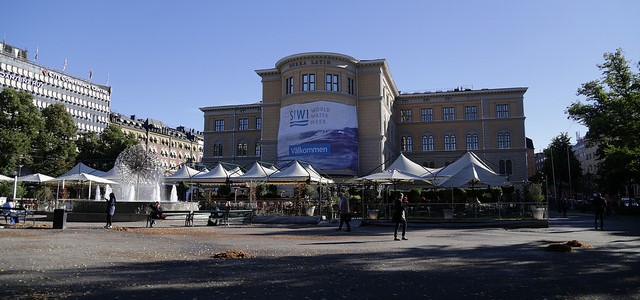Throughout the week, GWP will have a booth at the venue (in the same spot as last year, in Folkets Hus). Visitors will be able to meet and greet with key GWP people, write messages on our Twitter-wall, take photos of themselves in a photo booth, gather publications and take part in several publications launches.
In addition to this, on Tuesday 29 August, GWP and its partners from the Water for Youth and Climate initiative will have a full day of activities in the Young Professionals Booth. On the same day GWP is also facilitating an invitation-only breakfast meeting on "Accelerating SDG Delivery through Financing Water Security". The aim of the event is to come up with concrete solutions connected to water action fincancing.
Get a quick overview of GWP's World Water Week activities here!
Below a list of sessions where GWP is involved:
Opportunities and limits to water pollution regulations: Where water quality is impacted by point sources of pollution, the response has been to control and manage through legislation. However, in situations where water quality is impacted by diffuse source pollution, this mechanism is less effective and differing approaches are required. This session will explore these topics drawn from papers and panel discussion. Download flyer.
Understanding the gender dimension of water and waste: Water quality issues and waste water treatment are not gender neutral. The session will address the connection between equality issues, women’s concerns on around polluted water and (used) water treatment, and governance measures that can be taken. GWP's Ankur Gupta has written a blog about this in the lead-up to the event.
How to empower stakeholders reducing and reusing water; collaborative modelling: The side event will be an inclusive platform for knowledge and ideas sharing in relation to collaborative modelling, and specifically on how to actively involve stakeholders in informed decision making and as a result empower them to reduce and reuse water for securing water for all. Download flyer.
Water security and water integrity challenges in the MENA region: MENA is the world’s most water stressed region. Over 60% of MENA’s population lives under high or very high water stress, compared to some 35% for the rest of the world. This session explores how effective water governance that is integrity-bound can assist with overcoming the challenges.
MENA Focus: Investment potential in wastewater treatment and reuse: Wastewater management is an exceptional example of the paradigm shift towards sustainable development, providing multiple social and environmental benefits: from respect to the human right to water and sanitation and reduced health risks, to resource reuse and depollution efforts. This event aims to take stock of relevant country and Financing Institutions’ strategies and of best practices so far.
Sustainable wastewater and fecal sludge management in Asia: Fit-for-purpose solutions: In most Asian developing countries, a significant amount of wastewater generated by households and industries is still being discharged into water bodies without any treatment. The objective of this event is to elicit and propose effective ways to promote sustainable wastewater and sludge management.
Water and Faith: Building partnerships to achieve the SDGs: The ‘Water and Faiths’ session organised during the 2016 World Water Week demonstrated the potential synergies for collaboration. This year’s sessions showcases a series of concrete water projects led by faith based organisations which operate in diverse geographical and social contexts.
Circular economy cities: Transforming China and India's urban wastewater: A majority of the world’s cities are not equipped to sustainably deal with the booming waste generation challenges. The World Resources Institute is leading research on this topic, in partnership with GWP China and others. This seminar will showcase research on shifting the trend in wastewater/waste management towards a circular economy.
Integrated Urban Water Management (IUWM): Challenges and opportunities: The intent of this event is to raise the profile of IUWM through examining how efficiency gains can be achieved through integrating urban water management in cities.
Governance of water and waste: a key to sustainable development?: This seminar addresses governance of water and waste with a particular emphasis on wastewater management and reuse.
Implementing Integrated Urban Water Management (IUWM): Training tools and applied examples: Drawing on practical examples of challenges and responses, this event will present and discuss key principles and phases of employing an IUWM framework for water interventions in cities. It will introduce tools and approaches while showcasing experiences from cities in Brazil, Sweden, Ethiopia and the USA.
Full details about the week can be found on the website of World Water Week.

